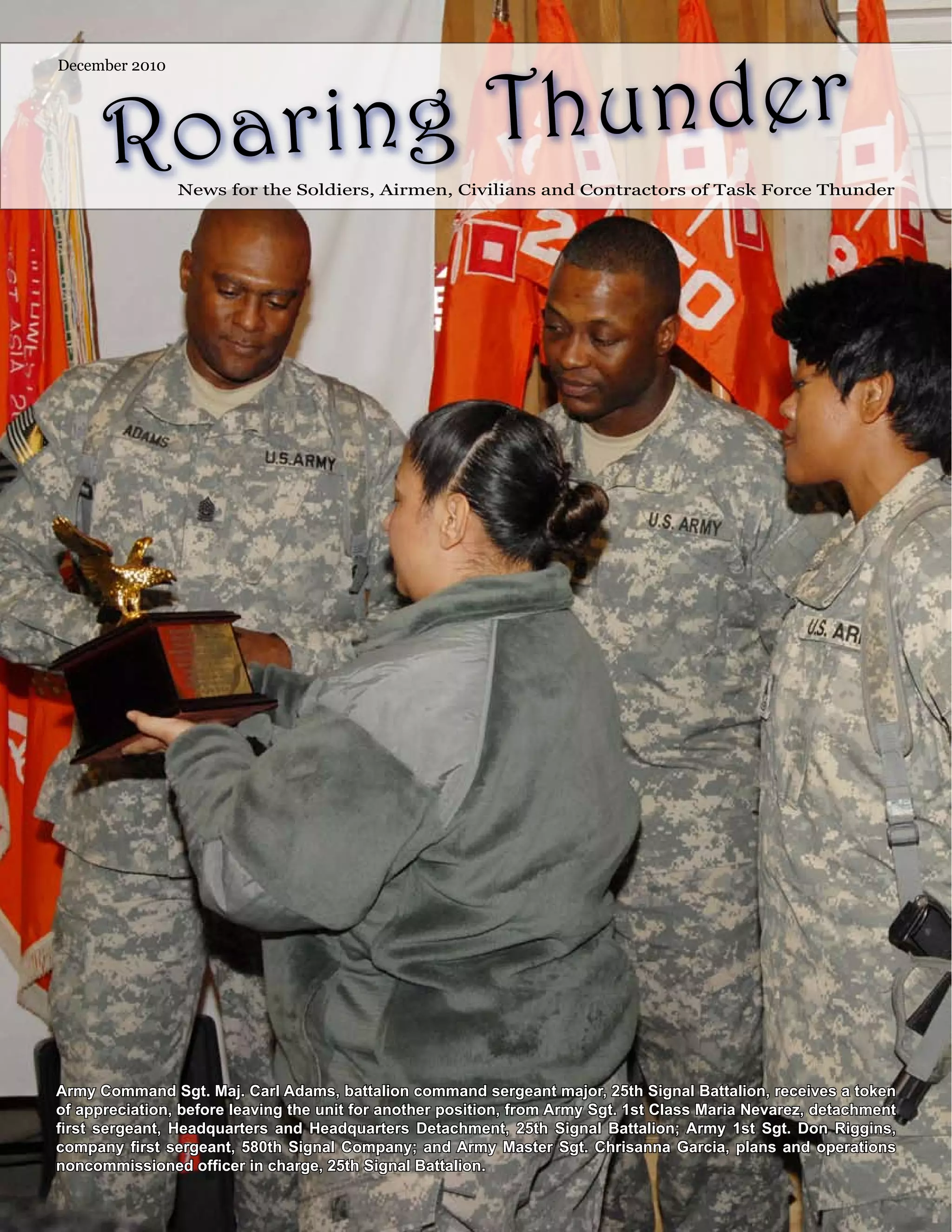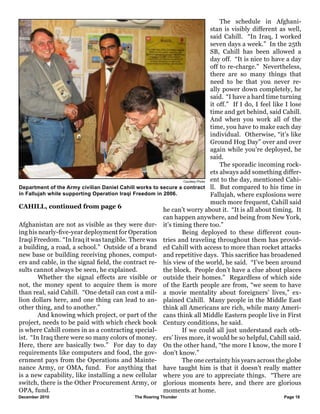1) The document profiles Daniel Cahill, a Department of the Army civilian who has spent over five years deployed in support of Operation Iraqi Freedom and Operation Enduring Freedom.
2) As a procurement analyst for the 25th Signal Battalion, Cahill helps military leaders secure communications equipment and infrastructure in accordance with government regulations.
3) While his contracting work is less visible than in Iraq, Cahill plays an important role in supporting soldiers with resources and ensuring taxpayer money is properly spent on military needs.

![December 2010 The Roaring Thunder Page 6
25th Signal Battalion Feature:
Not all “Servicemembers” Wear a Uniform
By Army Capt. Michelle Lunato
359th Theater Tactical Signal Brigade
Army Capt. Michelle Lunato, 359th Theather Tactical Signal Brigade
See CAHILL, page 16
Daniel S. Cahill, contract specialist, 25th Signal Battalion.
When people think of deployments,
they generally think of service-
members: Soldiers, Airmen, Marines and Sail-
ors. However, these are not the only people who
serve.
Throughout the years, there have been a
number of civilians who play a huge part on the
“battle fields” across the globe. These contribu-
tors don’t wear a uniform typically, but that does
not mean their efforts are of any less value. Nor
does it mean they spend less time away from their
families and home.
As a Department of the Army civilian,
Staten Island, N.Y. resident Mr. Daniel S. Cahill
has spent over five years deployed in support of
both Operation Iraqi Freedom, and now Opera-
tion Enduring Freedom.
For the past eight months Cahill, who is
stationed at Bagram Airfield as the procurement
analyst for the 25th Signal Battalion, has traveled
around the country with signal leaders in their
efforts to expand and develop the communica-
tions infrastructure for coalition forces. As mili-
tary leaders, along with technology contractors,
decide what they need to accomplish these tasks,
Cahill analyzes their plans. “We provide guid-
ance to the military and contractors so things can
be performed in accordance to government regu-
lations and laws,” said Cahill.
DA civilians, who are separate entities
from servicemembers and commercial contrac-
tors, are like a form of protection, said Cahill.
“We are like the shepherds and gate keepers.” To
protect the Soldiers, “I help them package their
requests so they can get what they need [within
regulations].” To protect the government, and
ultimately the contractors themselves, “DA civil-
ians provide responsibility for contractors to do
what they are supposed to do.”
In the ever-changing world of technology,
keeping up with all of that can be a challenge,
said Cahill, who was a communications specialist
when he was in the Army years ago. “Functional-
ly there are still similarities, but the current tech-
nology has opened systems more.” With more
ease and ability for the communication custom-
ers, comes more challenges for the signaleers,
and the team figuring out what to buy for them.
Advances in technology have “made it easier, but
have also made more layers – which has made it
more complex” for us in the field.
With all the different compartmentaliza-
tion, you can’t avoid one problem, warned Cahill.
“Technology allows you to do it, but the human
element can make it difficult.” Whether that
means innocent errors or malicious attacks on
the network, there is always something for the
signaleers to repair, maintain or replace.
Cahill said his contracting efforts here in](https://image.slidesharecdn.com/9c5e021f-9728-40c7-9652-9e0e839434d9-150215030441-conversion-gate02/85/Roaring-Thunder-December-partl-2-320.jpg)
